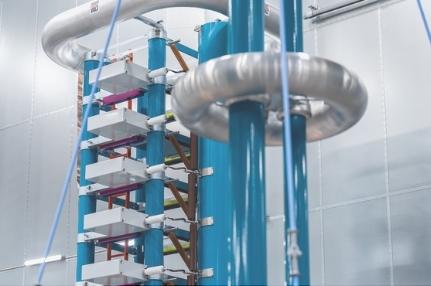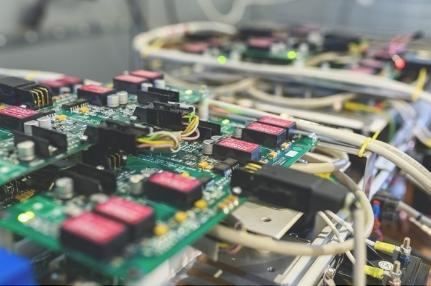Research & Collaboration
What makes us unique?
SuperGrid Institute owes its success to the people who make up our various research departments. Our teams come from diverse backgrounds in industry and academia, and their wealth of experience and skills make the Institute unique. Each individual brings specific expertise to the table.
This melting pot of knowledge offers opportunities for specialists from different fields to collaborate on new and innovative solutions to technical problems.
The Institute also benefits from close collaborative relationships with industry and academic institutions. The complementary strengths of our partners provide insights and innovative approaches to technical challenges. At the same time, we retain total independence in our research. Public-private investments and collaborative projects finance our work.
SuperGrid Institute’s state-of-the-art research facilities, test platforms and laboratories at the Villeurbanne and Grenoble sites are key to the success of our five research departments.


Latest scientific publications
Analysis of the Lower Limit of Allowable Energy in Modular Multilevel Converters
In this paper, a thorough analysis of the converter arm behavior is presented, which gives an analytic expression of the lower limit of the energy as a function of the converter operating point and the connected grid conditions. The relation between the lower energy limit and the operating power is analyzed by using the practical MMC specifications of an HVDC application. An experimental test of a small-scale MMC mock-up demonstrates the validity of the theoretical analysis.
Advanced Electrical characterisation of high voltage 4H-SiC PiN diodes
This paper reports the design, the processing, the static characterisation, the switching behaviour and the high current stress test of 10 kV aimed 4H-SiC bipolar diodes. The actual breakdown voltage of the selected devices is between 7 kV and 8 kV. The switching characterisations show a good behaviour with a t rr of only 90 ns. No degradation was observed after the application of 10 000 high current pulses during the stress tests.
Virtual capacitor for DC grid stability enhancement
With a growing number of commercial installations around the world, HVDC technology increased its presence and importance in the power systems. Among various converter topologies, the Modular Multilevel Converters (MMCs) are considered as the most suitable one for HVDC application today. Besides its recognised advantages over conventional converters, the MMC has an interesting extra degree of freedom, which is the energy stored in the distributed cell capacitors. Although the amount of this energy is relatively small, it can provide a significant contribution to the DC system stability when properly used. This paper presents experiment results that demonstrate the effectiveness of virtual capacitor control. This control, previously proposed by the authors, makes use of the above additional degree of freedom to attenuate fluctuations of the DC voltage, which tend to be inherently volatile against power disturbances compared to the frequency of conventional AC systems. Under the virtual capacitor control, the MMC behaves as if there were a capacitor on the DC side of the converter whose size is easily adjusted by the control variable and can be even bigger than the physical capacitor actually embedded in the converter. In practice, the emulation of the capacitor dynamics is realised by the auxiliary control which adjusts the exchange of the energy between the stacked cell capacitors and the DC grid during the transient. Thus, no adverse effect is imposed on the AC grid. Furthermore, the system operator can optionally adjust the equivalent capacitance of the system to achieve desired mitigation level of DC voltage fluctuation during the operation. Therefore, this additional degree of freedom can largely extend the operability of the DC systems. The feasibility and effectiveness of the virtual capacitor control is demonstrated by experimental results obtained by using a small-scale MMC prototype.







